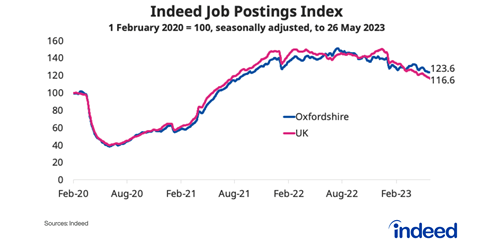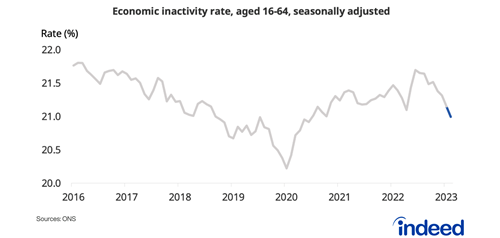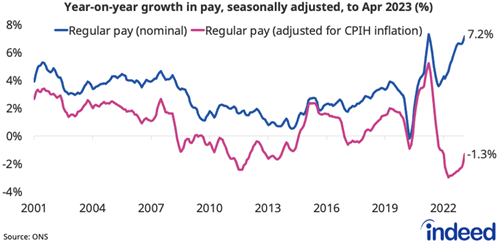Oxfordshire Recruitment Market Overview July 2023

Introduction
The UK economy is doing better than many expected but it is likely to remain sluggish in the second half of 2023. As with all national predictions though, there are stark regional variations.
Oxford is a case in point, having come out on top in the annual Demos-PwC Good Growth for Cities report for 2023, for the second year running. This index ranks the UK’s 50 largest cities against 12 economic measures, including jobs, income, skills, work-life balance and travel to work times.
Oxford achieved first place, ranking particularly highly for its high levels of employment and income generation. It is widely regarded as one of the UK’s most skilled and important city economies, contributing around £6.8 billion a year to GDP.
Oxford’s economy is predicted to remain strong in spite of a gloomier national picture, but that’s not to say it is immune to the challenges. Many Oxfordshire-based businesses are grappling with similar issues, including ever-increasing costs, bureaucracy, and severe skills and labour shortages.
One of the flipsides of Oxfordshire’s prosperity is that it is one of the most unaffordable places to live, with limited land available for building new homes – and commercial developments. Oxford and other parts of Oxfordshire also suffer from severe transport and connectivity issues.
Oxford City Council’s published vision is ‘to ensure that our growing economy provides jobs and opportunities for everyone at every stage of their lives’ while the Oxfordshire Local Enterprise Partnership (LEP) is focused on driving economic growth and helping to develop a ‘vibrant, sustainable, inclusive, world-leading economy – driven by innovation, enterprise and research excellence’.
This can only be good news for employers as well as the workforce of the future, which includes students wanting to remain in Oxford and other parts of Oxfordshire after completing their studies, highly skilled workers interested in relocating to the region, and the wealth of existing talent that already call this home.
Find out what the Oxfordshire recruitment market has in store for employers and jobseekers in the second half of 2023 in this report, compiled by Allen Associates using data insights from global jobs platform Indeed Hiring Lab, and the Office for National Statistics (ONS).
This report provides an overview of the Oxfordshire recruitment market as we find it mid-way through 2023 and discusses the potential impact of national employment trends and predictions on recruitment in the second half of the year.
A snapshot of the UK jobs market in the first half of 2023
According to the latest ONS data (March to May 2023) available at the time of publication, the number of job vacancies in the UK fell by 79,000 (or 7%) when compared with the record highs seen in 2022. This is still 250,000 more job vacancies in 2023 than in January to March 2020, just before the pandemic.
The largest fall in vacancies was in accommodation, food service, wholesale, retail, human health and social care – but again, vacancies within these sectors are still far higher than they were previously.
This dip in new vacancies being advertised reflects the uncertainly being experienced across most industry sectors, with economic pressures starting to impact recruitment in some areas.
Unemployment has risen slightly, with the ONS reporting 1.2 unemployed people per job vacancy in February to April 2023, compared with 1.1 in November 2022 to January 2023. These figures remain historically low though, contributing towards a tight labour market with demand continuing to outstrip supply.
Oxfordshire has more new vacancies than elsewhere in the UK
Although the overall volume of new job postings on Indeed has dipped in 2023, it is still above pre-pandemic levels, with Oxfordshire posting more vacancies than other parts of the UK.
This gradual decline in vacancies has been highlighted by the KPMG and REC ‘Report on Jobs’ which was published in June 2023 and based on responses from 400 employment agencies and recruiters. It points to a hiring slowdown across the UK this year and a fall in permanent placements being made.
Caution around the economic outlook and delayed decision-making are cited as major reasons for the gradual hiring slowdown being reported nationally.
Oxfordshire slightly outperforming the UK

Kate Allen, Executive Chair and Marketing Director at Allen Associates, which has a 25-year track record of recruiting in Oxfordshire, said: “Both permanent and temporary placements reached historic highs in 2021 and 2022 so it is unsurprising that the market is starting to settle and we are seeing some employers scaling back, with hiring levels moving closer to where they were before the Covid-19 pandemic began.
“This is not yet affecting hiring trends in Oxfordshire though – at least not at Allen Associates where we specialise in temporary and permanent recruitment across most of the business services functions, including PA and Administration, Marketing, HR and Finance. During the first six months of 2023, we continued to place high numbers of permanent staff in roles across Oxfordshire and we are not anticipating any significant changes to demand in the near future.
“What we have noticed though is that some employers are choosing to go down the temporary or contract route in the first instance, but in most cases this still leads to a permanent hire. This is not a new trend but rather a continuation of an old pattern of behaviour that became more popular during the pandemic when uncertainty and candidate shortages had a big impact on confidence and made it difficult for employers to plan.
“A temp-to-perm recruitment strategy works well for businesses with skills gaps or resourcing issues that are looking for an immediate solution without the long-term commitment.”

Kate Allen, Allen Associates Executive Chair and Marketing Director
What are the recruitment challenges facing Oxfordshire in 2023?
Oxfordshire has long been a magnet for business and investment, with thriving start-ups and university spin- offs, ambitious and fast-growing companies and well- established organisations and global brands, such as The University of Oxford, Oxford Brookes, Unipart and BMW all competing for top talent.
Skills shortages
The region has a much higher than average proportion of knowledge-intensive industries, which makes it difficult for many employers to recruit people with the niche skills needed for more specialist roles. This is exacerbated by the UK’s widening skills gap which the Government hopes to address through its ‘Local Skills Improvement Fund’. While the initiative has been broadly welcomed, The Recruitment & Employment Confederation (REC) and other bodies, argue that it doesn’t go nearly far enough and more needs to be done to upskill and reskill the UK’s workforce to meet employers’ needs and enable them to achieve their growth potential. Severe skills shortages have resulted in many hard-to- fill job vacancies in addition to any new roles which may become available due to staff turnover or business expansion.
Hiring demand and competitiveness
Demand for staff has been sustained in both the public and private sectors, with hotel and catering and accounting and financial services leading the way nationally. At Allen Associates, we have seen high demand from employers of all sizes from a wide range of industries and in the private and public sectors, all looking for quality candidates to fill long-standing vacancies as well as new ones.
Competition for the best people remains fierce with demand still outstripping supply.
How is economic uncertainty impacting the candidate market in 2023?
There are signs that the candidate market is starting to open up with the REC reporting the highest rise in the number of jobseekers since late 2020. This is attributed to redundancies and the gradual slowdown in hiring activity in some regions and in some sectors.
The number of people returning to work post pandemic is also rising although there is still a shortfall, with an estimated 380,000 fewer people of working age in the labour market than in early 2020.
Indeed believes this inactivity gap will continue to narrow in 2023 as ongoing financial pressures drive more people back into the labour market. While these factors may be helping to bolster the number of available candidates for certain roles, they are countered by the highest long term sickness rates on record. The physical and mental effects of Covid-19 together with long NHS waiting times are contributing to this, with significant numbers of people unable to return to work.
Overall, the UK labour market remains tight and continues to pose significant hiring challenges.
Eleanor Bromage, Managing Director at Allen Associates, commented:
“In cities such as Oxford, where unemployment is extremely low and skills shortages are severe, recruitment can be an ongoing challenge. Companies and institutions in the education, medical, science and technology sectors are among those that are finding it difficult to harness the skills they need. High volume employers are also reporting difficulties in being able to recruit fast enough to meet demand. None of these challenges are insurmountable but it does mean that employers are having to be realistic and flexible to attract and secure the people they want. Fortunately, our candidate pipeline is strong and we have good quality applicants for the business services roles that we recruit for in Oxfordshire. We’re proud of the fact that we interview and assess every candidate that we register on our database. This enables us to select and match candidates quickly and effectively leading to high success rates and a win-win for everyone."
“As we enter the second half of 2023, our placement success rate is way above industry average. This is down to the quality of our team and the candidates we attract, as well as the ways in which employers have adapted to the competitive market they find themselves in. These include the introduction of more effective recruiting processes, an agile approach to decision-making, competitive remuneration, flexible working options and investment in their workplace culture and employer brand.”

Eleanor Bromage, Allen Associates Managing Director
Inactivity gap continues to narrow

Pay and flexibility remain key to successful recruitment in 2023
Research shows that pay and flexibility are still the most important criteria for jobseekers looking for a new role in the UK today, and this is borne out by our own experiences at Allen Associates.
Flexible working
Although the candidate market in Oxfordshire is starting to open up, employers need to treat this good news with a degree of caution. The best people are still in high demand and the market is competitive. It is still common for candidates to have more than one job offer to choose from.
Increasingly, employers are trying to encourage people back into the workplace with more job adverts now specifying office-based requirements. Many candidates are resistant though and in some cases it’s a deal breaker. With some of the most qualified candidates still preferring to work from home, employers are advised to remain open-minded and flexible to attract as wide a talent pool as possible.
Salaries are rising at their highest rate
Employers have been increasing starting salaries year- on-year for permanent and temporary roles, with public sector pay growth catching up with the private sector.
According to the ONS, growth in average regular pay (excluding bonuses) was 7.2% in February to April 2023 – the largest growth in regular pay seen outside of the pandemic.
This growth in pay is helping to attract candidates, most of whom are salary-driven, but with average rises still below inflation, workers continue to feel worse off. In real terms (adjusted for inflation), growth in regular pay fell by 1.3% in February to April 2023.
Inflation is expected to gradually fall back in 2024 but in the meantime, employers will have to inflate salaries as high as they can and bolster them with benefits and perks that reflect the times and try to counteract some of the most common pinch points arising from the cost of living crisis. An agile and innovative approach is key – but don’t forget to take advice on any potential tax implications.
Financial incentives aside, employers with a strong brand, exciting business proposition, interesting work, strong ESG policies, great team or attractive culture will always be of interest to candidates.
Now is a good time for employers to review, evaluate and develop their retention and recruitment strategies. Your recruitment partner will be able to provide useful insights.
Strong nominal wage growth eroded by high inflation

An economist’s view
“The UK labour market remains resilient, though we’re well past the peak as the post-pandemic hiring boom fades. Vacancies and job-to-job moves have dipped from peaks but remain well above historic averages.
Despite a broadly uncertain economic growth outlook, along with strong headwinds as a result of higher interest rates and tighter monetary policy from the Bank of England, the unemployment rate remains near historic lows and the labour market remains fairly tight overall.
Though labour demand has been slowing, wage growth remains strong. Drivers include recent public-sector pay deals, a substantial increase in the minimum wage, and worker demands for pay to catch up to persistently high inflation. But with inflation still running even hotter than wages, most workers continue to face real terms pay cuts.
Looking ahead, we’re likely to see further softening in labour demand amid a fairly weak outlook for UK economic growth. But labour supply remains somewhat constrained, with economic inactivity remaining above its pre-pandemic level despite recent falls. Record long-term sickness remains a key concern. With inflation expected to gradually fall back over the second half of the year, workers may finally see some real terms pay growth. In the meantime, cost of living pressures continue to motivate jobseekers to try and obtain a pay rise. But flexibility also remains a key consideration, with candidates continuing to highly value remote and hybrid working options along with flexibility around hours and shifts. Employers need to evaluate their packages to remain competitive in attracting and retaining talent.”

Jack Kennedy, Senior Economist, Indeed Hiring Lab
5 takeaways for employers looking to recruit in 2023
As we work our way through the second half of 2023, there are 5 key takeaways for employers wanting to get to grips with the labour market and improve their recruitment success.
The labour market is starting to open up in some regions and in some sectors, but overall it remains tight. Demand still outstrips supply and recruitment will continue to be challenging.
In spite of the economic uncertainties, there are still significantly more job vacancies than there were on the eve of the pandemic; numbers are dropping though and there are signs that the UK may be gradually returning to pre-pandemic levels
Wage growth is high
Inflation is even higher so workers feel poorer in spite of pay rises and employers have to work harder to retain and attract the best people
Pay and flexibility matter most to prospective new employees
Further insights
Research shows that pay and flexibility are still the most important criteria for jobseekers looking for a new role in the UK today, and this is borne out by our own experiences at Allen Associates.
Setting the scene for 2023
Oxfordshire Recruitment Market Overview – January 2023
Background reading: Recruitment market conditions in 2022
Visit Indeed Hiring Lab for the latest insights on the UK jobs market.
Monthly webinars
Join our community of Oxfordshire-based HR professionals, managers and employers at our online HR Hubs which take place online and feature presentations by guest speakers, employment law updates, live polls and more.
For further details, visit Allen Associates HR Hub
About Allen Associates
Established in Oxford in 1998, Allen Associates is widely regarded as Oxfordshire’s leading independent recruitment consultancy for temporary and permanent roles at all levels in PA and Administration, Marketing, HR and Finance.
Our 25 year track record gives us unrivalled knowledge and insight into the Oxfordshire jobs market.
We have a well-established brand, underpinned by an excellent reputation, which helps us to attract the most successful businesses and globally-recognised organisations so you will be in very good company. This also means that we attract the best candidates.
Allen Associates is run by its founding directors, Kate and Rob Allen, and Managing Director, Eleanor Bromage. They are supported by a close-knit team of recruiters who are fully qualified and accredited and work collaboratively on every vacancy, so you can be assured of an excellent service and high success rates.
Contact us
For more information on the Oxfordshire recruitment market or any of the issues raised in this report, please contact our Executive Chair and Marketing Director Kate Allen.
If you are hiring and have a vacancy that you would like to discuss with us, please contact our Managing Director Eleanor Bromage or another member of the Allen Associates team.
You will also find useful information in the Employers section of our website.